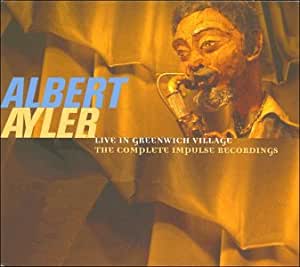• Albert Ayler: Live in Greenwich Village: The Complete Impulse Recordings, Impulse,1998.
THE COMEDY duo Bob & Ray had a character, Barry ‘Mr. Square Music’ Campbell and his Makes You Go Home Humming the Melody Orchestra. The twist? A live recording excerpt featured extraneous noise, a fight going on in the background, the band totally out of sync . . . in other words, cacophony.
To the first-time listener, jazz legend Albert Ayler might sound like a colleague. But pay attention, and it’s hardly the case. Along with Ornette Coleman, Archie Shepp and Pharaoh Sanders, Ayler was a leading light in the New Thing movement of the mid-1960s, which at the time appeared to be a radical step away from jazz tradition, demonstrating total indifference to all that had come before.
Three decades on, it’s easy to enjoy this music without having to argue the sociopolitical ramifications. It’s simply great music.
Coming on like a drunken Pentecostal service, there’s joy, confusion and a wondrous sense of spontaneity throughout this two-CD set. Ayler’s earliest performances took place in churches, and titles like ‘Holy Ghost,’ ‘Light in Darkness’ and ‘Divine Peacemaker’ show a yearning for all things holy.
With a mix of African-American worship (including whoops and shouts of joy), New Orleans brass bands, folk melodies, even some Rhythm & Blues, the sound remains absolutely unique.
Instrumentation was likewise one of a kind, including two acoustic basses, a cello, violin, trumpet, trombone, and Ayler himself on alto and tenor. Anyone interested in something a bit — make that a lot — more adventurous, check it out.
• Kirk Whalum: The Gospel According to Jazz, Chapter One, Warner Gospel, 1998.
Tenor sax player Kirk Whalum’s roots are firmly entrenched in gospel music. His father is pastor of Olivet Baptist Church in Memphis, and as a youngster he played horn in the church choir.
Whalum describes himself as the unofficial chaplain of Whitney Houston’s backing band, of which he is a long-standing member. And a decade ago, in between tours with Take 6, George Benson and Nancy Wilson, Whalum founded the Musicians’ Bible Fellowship in Pasadena.
Described as his first trip ‘back home’ to gospel music, The Gospel According to Jazz was recorded live in Nashville. Although it features some heavy hitters, including George Duke and Paul Jackson Jr., it’s more a lightweight pop/funk workout than jazz.
Whalum is a fine player. For some, his presence makes pop, R & B and quiet storm palatable, but his solo discs — this is his seventh — have been consistent disappointments.
• Jazz Revival, Brentwood,1999.
• The Brentwood Jazz Quartet: Best of the Brentwood Jazz Quartet, Brentwood, 1999.
Taking on gospel standards like ‘What a Friend We Have in Jesus,’ ‘Holy, Holy, Holy,’ and ‘I Love to Tell the Story’ might sound like a great idea, but as wonderful as these pieces may be in church, they just don’t work here.
It’s not so much the choice of material as the treatment. A blurb on the cover says, “For years listeners have relaxed to the soothing sounds of The Brentwood Jazz Quartet” . . . and that’s the problem.
The music comes across as a tamed beast, declawed and without purpose. The playing is competent, never intrusive . . . and boring. Suitable for an elevator ride maybe, but not much else.
The idea of playing gospel material in a jazz context has been realized far more successfully a number of times in the past, a recent example being Steal Away (Verve, 1995), a duet album from bassist Charlie Haden and pianist Hank Jones.
© John Cody 1999
